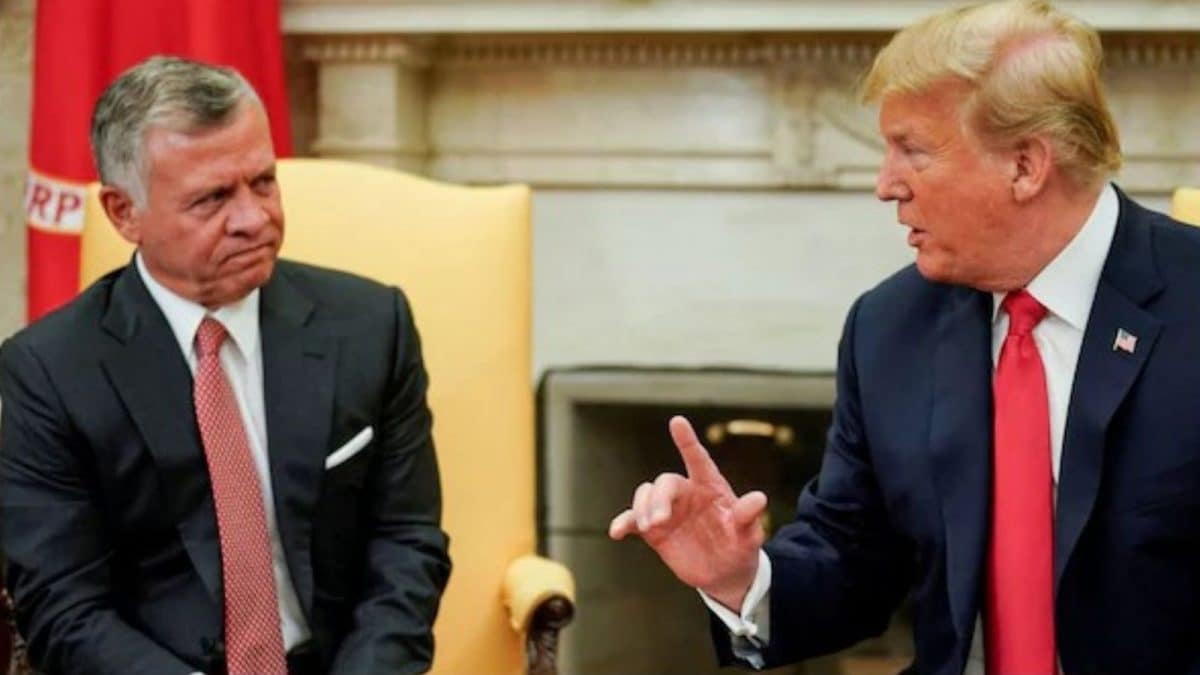 |
|
The article details the significant pressure exerted on Jordan's King Abdullah by former US President Donald Trump regarding his controversial plan to take over the Gaza Strip and relocate its Palestinian population. Trump's proposal, unveiled during a White House meeting with King Abdullah, involved the potential relocation of Gaza's two million Palestinians to other countries, including Jordan. This proposal was met with immediate and firm rejection by King Abdullah, who publicly reiterated Jordan's steadfast opposition to the displacement of Palestinians, aligning with the unified Arab position. He emphasized the need to prioritize rebuilding Gaza without displacement and addressing the dire humanitarian situation. This rejection, however, is complicated by Jordan's significant reliance on US financial aid, making the threat of withholding this aid a powerful lever for Trump's pressure.
The article highlights the complex geopolitical landscape surrounding this issue. Jordan, as the fourth-highest recipient of US foreign aid in 2023, receiving $1.72 billion, has a considerable stake in maintaining positive relations with the US. However, the history of US-Jordan relations is fraught with tension, particularly during Trump's first term, marked by the controversial relocation of the US embassy in Israel to Jerusalem and the perceived lack of clarity regarding Jordan's role as custodian of holy sites in Jerusalem in Trump's 2020 Middle East peace plan. Although relations improved under President Biden, with a new memorandum of understanding securing continued US financial support, Trump's renewed pressure threatens to destabilize this relatively improved relationship. The significant economic and military aid Jordan receives from the US directly impacts the King's ability to resist Trump's pressure, forcing him to navigate a delicate balance between maintaining his people's support and preserving his country's vital economic and military alliance with the United States.
The implications of Trump's plan extend far beyond the immediate pressure on King Abdullah. The plan itself has drawn comparisons to the Nakba, the 1948 ethnic cleansing of Palestinian Arabs, triggering widespread protests in Jordan. These protests underscore the deep-seated opposition within the Jordanian population to any plan that involves the displacement of Palestinians, particularly given the already large Palestinian refugee population residing within Jordan. The article further explores the broader regional context, highlighting the impact of the Gaza war on Jordan's economy and security, including increased drug and weapon smuggling, economic strain on tourism and trade, and a rise in Hamas's popularity. The potential for further escalation in the West Bank adds another layer of complexity, with Amman expressing clear concerns about the possibility of a new influx of refugees and the subsequent political, economic, and security challenges. The article also touches on the recent tensions between Jordan and Iran following Iran's missile attacks on Israel, emphasizing Jordan's commitment to self-defense and its determination not to become a battlefield for regional conflicts.
The article concludes by analyzing the potential consequences of the US failing to balance the interests of both Israel and Jordan. This imbalance, it argues, could lead to increased subversion against the Jordanian government, further threatening the kingdom's stability. The mention of Jordan's 1994 peace treaty with Israel highlights the precarious position of the Jordanian monarchy, caught between its domestic concerns, its reliance on US support, and the pressure from Israel and the United States. The prospect of revoking this treaty is viewed as a highly risky move, potentially further escalating tensions with Israel and jeopardizing Jordan's already strained relationship with the US. The pressure exerted by Trump, therefore, presents a complex challenge to King Abdullah, demanding a careful and strategic response to maintain stability both within his kingdom and in the wider volatile region.
Ultimately, the article paints a picture of a deeply complex and precarious situation. King Abdullah finds himself maneuvering between powerful external forces – a demanding US ally and a neighboring Israel with its own interests – while simultaneously attempting to appease his own population deeply wary of any plan that threatens the already fragile situation of Palestinian refugees in his country. The long-term implications of Trump's proposal, particularly concerning the future stability of Jordan and the broader Middle East, remain deeply uncertain and profoundly concerning.
Source: Why Is Jordan's King Abdullah Under Pressure From Trump Over Gaza Plan? Explained
